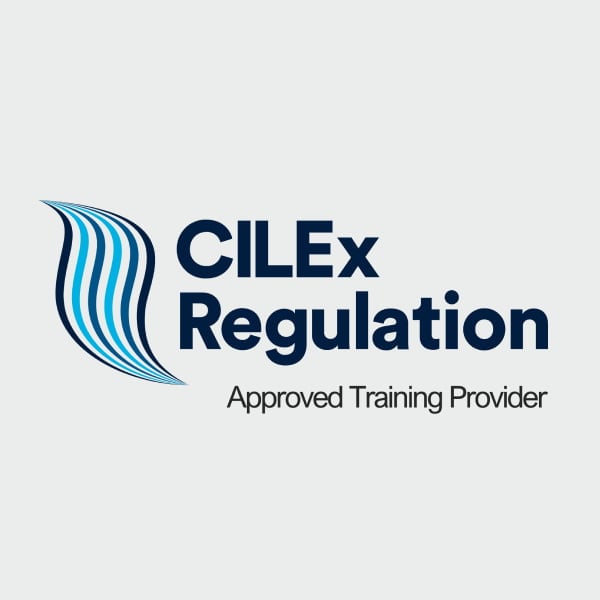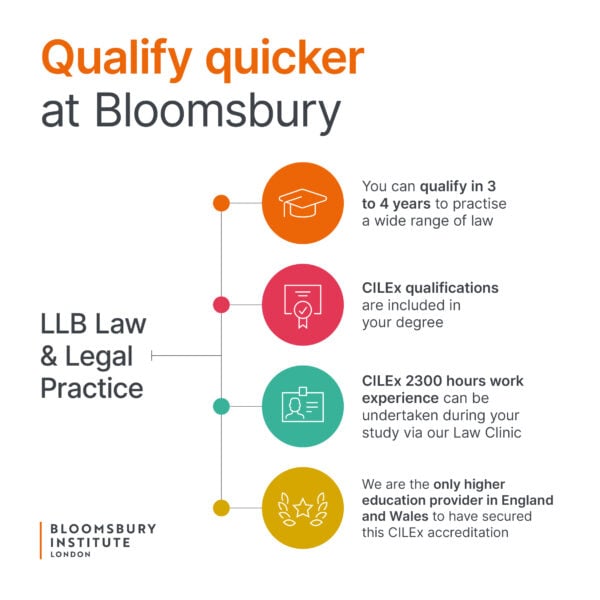Uniquely, graduates from Bloomsbury Institute’s LLB Law and Legal Practice course also meet CILEx Regulation standards, but how does this help you qualify quicker?
What is CILEx?
The Chartered Institute of Legal Executives (CILEx) is the professional body for legal executives. There are over 17,500 members of CILEx, including 7,000 practising legal executives in England and Wales.
The CILEx Professional Qualification (CPQ) is the usual route to qualify as a legal executive, it is highly prestigious and being a Fellow of CILEx/ Chartered Legal Executive improves employment prospects vastly.
Uniquely, our LLB in Law and Legal Practice satisfies CILEx Regulation’s Knowledge and Skills Education Standards, so our graduates do not need to complete the CPQ in order to practice as a Legal Executive. Graduates from our degree could immediately work in a law firm in roles such as a Trainee CILEx Lawyer, Paralegal or Legal Clerk and are permitted to use the title ‘CILEX Member Advanced Paralegal’ once they have registered with CILEx. After completing 2,300 hours of qualifying experience, our Law graduates are then eligible to be admitted as a Fellow of CILEx and a Chartered Legal Executive.
Time spent volunteering at the Bloomsbury Law Clinic can also count towards your qualifying experience.

Pathways into legal professions
Accreditation from CILEx Regulation is just one of the ways we are enhancing our law students’ learning opportunities and their graduate employment prospects.
In Law, there are broadly seven regulated professions and gaining CILEx Regulation accreditation as part of your degree may help you to cross-qualify or enter other branches of the profession in the future. If you complete your LLB at Bloomsbury Institute, and take an active role in our Law Clinic to gain qualifying experience, then you can fully qualify as a Chartered Legal Executive in just 3 – 4 years!
See below for a more detailed breakdown of pathways into the legal professions.

| Time to qualify | Rough salary expectations (in London) |
| 2 – 3 years | Around £28,000 |
These are entry-level positions within the legal profession, trained in some legal matters but not fully qualified as lawyers. Qualifications aren’t strictly needed for these entry-level positions, you can start working as a Paralegal/ Legal Clerk or Trainee CILEx lawyer as soon as you graduate, or even part-time alongside your studies.
Having an accredited LLB from Bloomsbury Institute will make you a much more appealing candidate to employers.
| Time to qualify | Rough salary expectations (in London) |
| 3 – 4 years | Up to £38,000 |
A CILEx Fellow is a type of lawyer, like a solicitor but the route to qualification is different than the route to qualifying as a solicitor. CILEx Fellows can carry out much of the work of a solicitor and they can charge the same hourly rates as solicitors. A CILEx Fellow can also go on to qualify as a CILEx Practitioner or a CILEx Practitioner Litigator and Advocate.
To practice as a CILEx Fellow, you need to be admitted by CILEx Regulation as a Fellow having met their knowledge and education standards, and completed a minimum of 2,300 hours’ of qualifying legal experience.
Bloomsbury’s LLB graduates meet the CILEx Regulation knowledge and education standards. They can also undertake hours of legal experience alongside their studies, independently or via our law clinic.
| Time to qualify | Rough salary expectations (in London) |
| At least 5 years | £35,000 – £55,000 |
Chartered Legal Executive Practitioners (CILEx Practitioners) can practise their specialist area in a regulated firm without supervision. To practice as a CILEx Practitioner, you need to be admitted by CILEx Regulation as a Fellow, having met the knowledge and education standards, and be awarded a certificate in your chosen area of expertise. The areas of expertise are vast covering civil, criminal and family litigation, probate, conveyancing and immigration.
An applicant in good standing and who has three years’ general legal experience, including experience in the two years preceding the application in their chosen area of expertise, may apply to CILEx Regulation to be granted the Practitioner Certificate.
Bloomsbury’s LLB graduates already meet the CILEx Regulation knowledge and education standards. Depending on the optional modules studied at level 6, our graduates will also be able to apply for a certificate in Immigration, Conveyancing, Probate or business. They can also undertake hours of legal experience alongside their studies, independently or via our law clinic.
| Time to qualify | Rough salary expectations (in London) |
| At least 5 years | Around £60,000 |
Chartered Legal Executive Litigators and Advocates are types of CILEx Practitioner who are able to complete work involved in preparing for and going to court. CILEx Litigators and Advocates are able to sort out disputes and speak on a person’s behalf in judge’s chambers, similar to a Solicitor or Barrister but specialised in specific areas of the law.
In order to practice as a CILEx Litigator or Advocate, you need to be admitted by CILEx Regulation as a Fellow, having met the knowledge and education standards, and be awarded a Rights to Conduct Litigation Certificate as well as a Rights of Audience Certificate. An applicant in good standing and who has three years’ general legal experience, including experience in the two years preceding the application in their chosen area of expertise, may apply to CILEx Regulation to be granted the certificates.
Bloomsbury graduates that have completed the LLB Law and Legal Practice, including the relevant Level 6 modules, will have satisfied the knowledge and education standards to apply for the Rights to Conduct Litigation Certificate. Hours of legal experience can be taken alongside their studies, independently or via our law clinic.
At the same time as applying for their Litigation Certificate, our graduates must also apply to CILEx Regulation to be granted one or more Rights of Audience Certificates. Graduates who seek a Rights of Audience Certificate must demonstrate that they meet the required knowledge and competence requirements by completing an accredited advocacy skills course in addition to their degree.
| Time to qualify | Rough salary expectations (in London) |
| At least 5 years | £55,000 – £90,000 |
Solicitors primarily perform legal work outside of the court room, although some do conduct court advocacy like barristers. To practise as a Solicitor, you need to successfully complete a degree or equivalent qualification, in any subject, plus pass parts 1 and 2 of the Solicitors Qualifying Exam (SQE). You will also need to complete 2 years’ qualifying work experience (QWE).
Bloomsbury graduates that have completed the LLB Law and Legal Practice will be prepared for part 1 of the SQE (legal knowledge). Our graduates can also undertake hours of legal experience alongside their studies, independently or via our law clinic, which will count towards their QWE. Additionally, Bloomsbury graduates that have completed the LLB Law and Legal Practice and gone on to qualify as a CILEx Fellow or a CILEx Practitioner may apply for exemptions from the SQE.
| Time to qualify | Rough salary expectations (in London) |
| At least 5 years | £70,000 + |
Barristers mainly defend people in court and speak on the client’s behalf (advocacy). You need to successfully complete a Law Degree, and the Bar qualification (which takes one year) before being called to The Bar. You will also need to have completed one year ‘on the job’ (which is called pupillage in chambers) before you fully qualify as a Barrister.
Bloomsbury graduates that have completed the LLB (Hons) Law and Legal Practice will have met the academic component and will hold a Law Degree enabling them to progress to the vocational component of the Bar Qualification. Additionally, Bloomsbury graduates that have completed the LLB Law and Legal Practice and gone on to qualify as a CILEx Practitioner with litigation and advocacy rights may apply for exemptions from the Bar Course and pupillage.
Next steps

Our LLB in Law and Legal Practice satisfies CILEx Regulation’s Knowledge and Skills education standards; this provides pathways to becoming Immigration, Conveyancing, Probate or Business CILEx Practitioners.
Graduates that wish to become a CILEx Practitioner in one of these specialisms, and gain practicing rights from CILEx, will need to have undertaken the relevant optional module(s) on the final stage of their degree (Level 6). They will also need to be in good standing and have three years’ general legal experience, including two years of legal experience in their chosen area of expertise, before they make their application.

A Chartered Legal Executive can represent clients in court if they qualify as a Chartered Legal Executive Advocate. If you wish to become an advocate or litigator, then our LLB in Law and Legal Practice satisfies the CILEx Regulation knowledge and skills education standards to become a Chartered Legal Executive Litigator and Advocate in either criminal or civil litigation.
Graduates that have completed the LLB Law and Legal Practice, including the optional Level 6 modules ‘Criminal Litigation and Advocacy’ and/or ‘Civil Litigation and Advocacy’, will also need to complete an accredited litigation advocacy skills course. Graduates that go on to complete that course, and have three years’ general legal experience (including two years of legal experience in their chosen area of expertise) will be able to apply to CILEx Regulation to become a Chartered Legal Executive Litigator and Advocate.

You can qualify as a Chartered Legal Executive, then as a solicitor and you may be eligible to apply for exemptions from assessments in the SQE. Exemptions from SQE assessments are only available to qualified lawyers; Chartered Legal Executives hold a legal professional qualification which allows them to practice in the UK and are therefore eligible to apply. You may also be able to gain additional exemptions based on work experience.
Frequently asked CPQ questions
Qualifications aren’t strictly needed to begin studying for your CPQ, but having an accredited LLB from Bloomsbury Institute will make you a much more appealing candidate to employers. You can start working as a Paralegal/ Legal Clerk or Trainee CILEx lawyer as soon as you graduate, or even part-time alongside your studies.
The CPQ is primarily for English and Welsh law, however, the qualification is graded at Level 6, the same level as undergraduate degrees. Many international legal systems share similarities with the British legal system and many legal regulators/ professional bodies will recognise CILEx, so you may be able to convert your CILEx qualification to suit jurisdictions.
CILEx Practitioners tend to specialise in certain areas of law (as apposed to Solicitors whose qualifications are more generalised). CILEx Regulation accredits our LLB graduates for the following pathways: Dispute Resolution (Civil Litigation), Criminal Litigation, Immigration, Probate, Conveyancing, and Business, depending on which modules students have successfully completed.
Though there is no limit to how long you have to complete the CPQ, CILEx believe it should take around 2 years to complete the Level 6 Diploma and achieve Trainee CILEx Lawyer status after you have obtained your undergraduate degree. As our LLB course is accredited by CILEx Regulation, our law graduates only need to complete the 2,300 hours of qualifying experience in order to register as a CILEx Lawyer, part of which can be complted alongside your degree via our Law Clinic.
You will need to renew your CILEx membership annually and complete CPD throughout the year in order to maintain Chartered Legal Executive status.
Bloomsbury Institute LLB graduates can register with CILEx for their CILEx Fellow Member Fee which is currently £367. You will also need to finance Application Fees to CILEx Regulation in order to fully qualify.
Useful resources
CILEx Regulation is the independent regulatory body of the Chartered Institute of Legal Executives.
CILEx is the professional body for legal professionals in England and Wales.
The Law Society is the professional body for Solicitors in England and Wales.
The Bar Standards Board is the regulatory body for barristers in England and Wales.
Learn more about our Law Clinic and how it can help you to qualify quicker.
Explore our CILEx Regulation accredited courses
Duration:
2 YearsStudy:
Full-TimeStart:
Apply now to start in October 2025The Bloomsbury Institute difference

Students build up their hours on course, for example via Bloomsbury Law Clinic.

In the heart of London’s education quarter, with access to Birkbeck’s vast library and resources.

As soon as International students are enrolled on the pre-sessional programme or their degree course, they will have access to Student Circus, providing a wealth of vacancies, support, employability courses and resources.

The Student visa entitles students to work 20 hours per week, full-time during vacation, and on successful course completion they receive a further two-year Graduate visa.